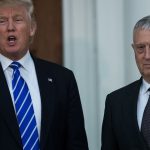by David Isenberg
Polling shows that an overwhelming majority of Americans, regardless of political orientation, agree that money has too much power in American politics. However, many don’t understand how that power affects U.S. national security. In many ways, the overwhelming influence of money on policy-making compromises our safety from threats both internal and external.
Most people are familiar with President Dwight Eisenhower’s famous farewell address warning about a military-industrial complex. But one sentence in it has been largely overlooked:
The prospect of domination of the nation’s scholars by Federal employment, project allocations, and the power of money is ever present – and is gravely to be regarded.
Although Eisenhower was talking about the cooptation of America’s academics, his essential point, that the influence of money could have a dangerously corrupting influence on America’s national security, was dead on. But even Eisenhower could not have imagined just how powerful the influence of money would become.
The denizens of a powerful Military-Industrial-Congressional Complex can be found every day in Washington, D.C., arranging campaign donations, operating Super PACS, hosting fundraising dinners, and influencing the legislative and, sometimes, the executive branch. For the last year, they’ve also been investing heavily in the Republican and Democratic presidential campaigns.
Follow the Money
Examples of money in politics distorting or endangering national security are common. In June, Rajiv Fernando, an electronic investment expert and a major donor to both the Clinton Foundation and Hillary Clinton’s presidential campaign, was reportedly placed on the International Security Advisory Board (which provides the State Department with independent insight and advice on all aspects of arms control, disarmament, nonproliferation, and international security). He resigned after ABC News reported on his appointment. But it should give any sane person pause that someone with no relevant credentials could be appointed to a board that advises the government on nuclear weapons policy.
Although lobbing is a constitutionally protected, value-neutral right, its vastly expanded use in national security policymaking has been perverted and utilized to help create and perpetuate bad policy decisions.
There is no mystery why corporations lobby. It pays to do so. In 2014, the Sunlight Foundation reported that between 2007 and 2012, 200 corporations spent a total of $5.8 billion on federal lobbying and campaign contributions. In return, these corporations received $4.4 trillion in federal business and support. For every dollar the companies spent on political influence and access, they got $760 from the federal government.
Many politicians claim that they can’t be bought by a mere campaign donation or PAC contribution. They mean that their vote can’t by bought by something like a blatant bribe. Although bribes do occasionally happen, lobbying is subtler. Much of the time a lobbyist provides support and useful information for a position a legislator already holds. At other times, the issue of interest to the lobbyist (and his or her client) is one about which the legislator has no firm position, or even knowledge, and one about which the public is not paying any attention. In such circumstances the legislator is often willing to help a friendly lobbyist achieve her client’s interests, especially when the client is a constituent or has business affecting the legislator’s district.
Much more important, however, is the money that contractors can contribute, especially by bundling them through PAC contributions. In 2014, John McCain (R-AZ), chairman of the Senate Armed Services Committee, received $249,200 from the defense sector, of which $198,900 came from defense PACs. Sen. Jack Reed (D-RI), also on the same committee, received $447,000 from the defense sector, $403,100 from defense PACs.
The Defense Lobby
Today’s military contractors are highly sophisticated and successful companies. They have done exceedingly well the past five years. They have vast budgets for lobbying and are not shy in using them to make campaign donations and job appeals.
In 2015, the Senate was debating the National Defense Authorization Act, which contained reforms of the acquisition process affecting Pentagon defense contractors. During the first quarter of 2015, Honeywell’s PAC topped the list of corporate PACs that contributed the most money to members of Congress. Joining Honeywell ($553,999) on the list were Northrop Grumman ($416,900), and Boeing ($304,500), which spent millions on lobbying when they earlier competed for the new Long Range Strike Bomber contract in the NDAA. Raytheon also contributed $238,500.
Some members of Congress are especially vulnerable to lobbying by military contractors due to the economic makeup of their districts. In her 2014 book The American Warfare State: The Domestic Politics of Military Spending, political scientist Rebecca Thorpe found that “districts with less diverse economies are disproportionately reliant on defense dollars that they receive.”
Consider the Joint Strike Fighter program. Its technical problems have been well documented over the years. What has not been nearly as well understood is the huge lobbying effort behind it, spearheaded by Lockheed Martin. With 12 in-house lobbyists working on the issue, the contractor also paid over $7 million to keep 26 K Street firms on retainer for 2014. BAE Systems, United Technologies, Rockwell Collins, and Northrop Grumman have also maintained similar lobbying efforts.
But the F-35 lobbying goes well beyond that. In 2011, Kay Granger (R-TX) and Norm Dicks (D-WA) announced the formation of a Congressional Joint Strike Fighter (JSF) Caucus. The primary contractors building the JSF (Lockheed Martin, Northrop Grumman, BAE Systems, and Pratt & Whitney) contributed $326,400 to members of the JSF Caucus in the first year of the 2012 election cycle. These firms’ PACs, which distribute campaign contributions to promote the contractors’ political goals, gave the average member of the JSF Caucus $6,094 — nearly double what they gave to the average representative not in the caucus ($3,077). Furthermore, the home states of members of JSF Caucus receive a disproportionate share of JSF dollars, and, in turn, jobs for their constituents.
Lobbying and campaign spending distort national security policy decision-making. The sheer enormity of the defense industry’s lobbying in pursuit of its interests is overwhelming to members of Congress, who have very little stake in standing up to the defense establishment and lots to lose by doing so. Moreover, the ability to give enormous campaign donations provides the defense industry a disproportionate edge in pushing projects and programs that are not necessarily in the national interest. As John McCain wrote in 2011,
The fiftieth anniversary of President Eisenhower’s address presents us with a valuable opportunity today to carefully consider, have we heeded President Eisenhower’s admonition? Regrettably and categorically, the answer is, no. In fact, the military-industrial complex has become much worse than President Eisenhower originally envisioned: it’s evolved to capture Congress. So, the phenomenon should now rightly be called, the ‘military-industrial-congressional’ complex.






Great piece.
I wonder if anyone has ever attempted to estimate how much feather-bedding and pork-barrelling distorts the comparison between US military spending against that of its near-peers?
As in: the USA may spend more than 10x as much money on its military budget as (say) the Russians, but if that money is monumentally ill-spent then that may lead to a grossly-distorted view of the war-waging capabilities of those two nations.
So much so that the Washington think-tanks may, indeed, urge a future President Clinton to start a war that the USA ends up losing.
And losing because of the simplest of things: nobody told Hillary that the F-22 Raptor can’t fly when there’s a thunderstorm, or that Russian SAM’s aren’t the least bit confused by the F-35’s “stealth” features, or that the closest a Nimitz-class carrier dares to sail off the Syrian coast doesn’t actually fall within the radius of operation of an F-18 Hornet.
Good points. Re pork-barreling see the classic analyses by Chuck Spinney, to start with.